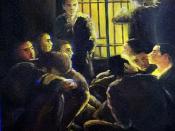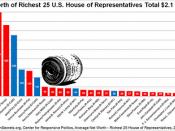"It appears to general observation, that revolutions create genius and talent; but these events do no more than bring them forward. There is, existing in man, a mass of sense lying in a dormant state, and which unless something excites it to action, will descend with him, in that condition, to the grave. As it is to the advantage of society that the whole of its facilities should be employed, the construction of government ought to be such as to bring forward, by quiet and regular operation, all that capacity which never fails to appear in revolution"--Thomas Paine.
Thomas Paine observed that the creative genius that appears to arise in revolutions is in fact there all the time, it just lies dormant. The question for a democratic society is: "How can we realize the talents of the masses without a bloody revolution?"
Writing at the time of near-absolute monarchy, Paine put forward the radical idea of representative democracy.
He thought that if we had broad geographical representation we would have a government that was accountable to the people. He has been proven wrong. We have elected elite, with the electorate reduced to election fodder, whose only function is to endorse one or more of near identical corporate controlled clones at election times, then fall back into silent apathy.
This is not a recent phenomenon. As early as the 1940s and 1950s, political commentators were observing the place of the electorate in a modern democracy. Seymor Lipset refers to 'the formation of a political elite in the competitive struggle for the votes of a mainly passive electorate' then went further 'the belief that a very high level of participation is always good for democracy is not valid'. Joseph Schumpeter emphasized the same point; voters 'must understand that, once they...


